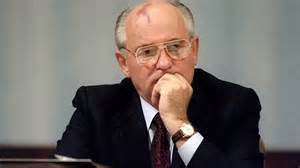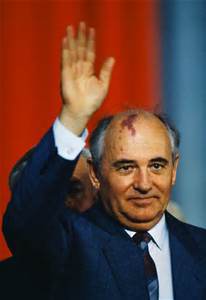The Nuclear Challenge: 70 Years after Hiroshima and Naasaki – Gorbachev’s Response (3)
WEAPONS OF MASS DESTRUCTION, 7 Sep 2015
Richard Falk – TRANSCEND Media Service
 READ: PART 1 – PART 2 – PART 4 – PART 5 – PART 6 – PART 7 – PART 8 – PART 9 – PART 10
READ: PART 1 – PART 2 – PART 4 – PART 5 – PART 6 – PART 7 – PART 8 – PART 9 – PART 10
No public figure was more convincing and determined to pursue the ideal of a world without nuclear weaponry than Mikhail Gorbachev while he was the transformative General Secretary of the Communist Party of the Soviet Union between the years of 1985 and 1991. Of course, Gorbachev is appreciated in the West mainly as having presided over a political process that led to the nonviolent ending of the Cold War, the peaceful liberation of Eastern Europe, and the collapse of the Soviet Union. Yet he was also perhaps the only head of an important sovereign state during the nuclear era whose commitment to nuclear disarmament and the conditions of a peaceful world reflected a deep realization that the existing world order was not sustainable and not serving the interests of the Russian people. His speeches at the United Nations and elsewhere exhibited ethical and political concerns that recognized that national interests could no longer be separated from the promotion of global and human interests.
 Gorbachev believed then, and continues to believe, that nuclear war becomes more likely, a virtual certainty, with each passing year; as more governments continue to possess and others over time gain access to the weaponry the risk of nuclear war rises. Gorbachev believes that it is inevitable that the nuclear club will grow gradually larger, as it has, although more slowly than some had feared. He also believed, reflecting the Cold War context within which he governed, that the illusionary search for a winnable combination of weaponry and doctrine could produce an unwanted nuclear conflict between rival superpowers either by one side seeking a victory or by the other preempting an opponent it perceived as dangerous so as to lessen vulnerability and avoid defeat. In the mid 1980s the Soviet system was experiencing a complex and deep crisis of economic stagnation and bureaucratic rigidity, which meant that the nuclear arms race burdened an already acutely stressed Soviet reality.
Gorbachev believed then, and continues to believe, that nuclear war becomes more likely, a virtual certainty, with each passing year; as more governments continue to possess and others over time gain access to the weaponry the risk of nuclear war rises. Gorbachev believes that it is inevitable that the nuclear club will grow gradually larger, as it has, although more slowly than some had feared. He also believed, reflecting the Cold War context within which he governed, that the illusionary search for a winnable combination of weaponry and doctrine could produce an unwanted nuclear conflict between rival superpowers either by one side seeking a victory or by the other preempting an opponent it perceived as dangerous so as to lessen vulnerability and avoid defeat. In the mid 1980s the Soviet system was experiencing a complex and deep crisis of economic stagnation and bureaucratic rigidity, which meant that the nuclear arms race burdened an already acutely stressed Soviet reality.
In an August 16th interview with the German magazine, Spiegel, Gorbachev strongly reaffirms his anti-nuclear outlook, and recalls the successes and disappointments of his efforts to rid the world of nuclear weapons. His skepticism about disarmament negotiations back in the 1980s is even disheartening today than when Gorbachev was in power. The approach then prevalent he regarded as a hypocritical blend of posturing and useless meetings, a pathetic wordplay in which “diplomats pored over mountains of paper, drank wine, and even harder stuff..and it was all for nothing.”
More helpful in Gorbachev’s view were unilateral steps taken in Moscow that acknowledged a growing danger of catastrophe that could only be removed by the “complete destruction of nuclear weapons and a permanent ban on them.” As significant as this serious affirmation of nuclear disarmament as a necessary and highly practical goal of state policy represented a shift in Soviet thinking and strategy that gave the highest priority to minimizing risks of war until a safer future could be brought into being by eliminating weaponry of mass destruction (including chemical weapons). This meant, in Gorbachev words, that instead of planning “for coming war” or seeking military advantages, the central policy effort was devoted to the prevention of “military confrontation with the West.” That is, war avoidance as an interim approach that depended on a Soviet foreign policy that consciously reduced international tensions rejected threat diplomacy and provocative policy moves.
Gorbachev surprisingly found that Ronald Reagan, his American right-wing counterpart, shared his nuclear anxieties, and was ready to be a partner in joint denuclearization efforts. Already in 1985 they jointly declared that “nuclear war cannot be won and must never be fought.” Gorbachev interprets this declaration as a commitment by the two governments not to seek a position of superiority based on developing new types of nuclear weapons (for instance, defensive shields that made an attack seem more plausible, and thus might tempt a potential target state to consider preemption), but claims that the United States never acted as if it understood this Reagan/Gorbachev declaration in this manner. Gorbachev does take appropriate note of Reagan’s deep attachment to SDI (Strategic Defense Initiative) as limiting the progress that the two leaders could make in relation to denuclearization, and incompatible with his recognition of what a horror nuclear war would be.
In this regard, Gorbachev considers United States militarism then and now to constitute the “insurmountable obstacle to a nuclear-free world.” As this unfortunately seems to be a correct assessment, it entails a gridlocked nuclear future with no escape route. Gorbachev expresses his almost fatalistic view of human destiny if nuclear weaponry is retained: “The alternative is clear: Either we move toward a nuclear-free world or we have to accept that nuclear weapons will continue to spread step by step across the world.” In effect, the only effective long-term nonproliferation regime is dependent upon a parallel regime of complete nuclear disarmament, and without such a regime nuclear war will occur at some point due to the sheer multiplication of nuclear actors.
As others have noticed, the highpoint in Gorbachev era nuclear diplomacy occurred at the Reyjkavik summit in 1986 when Reagan and Gorbachev seemed to be on the historic verge of agreeing on the obligatory elimination of all nuclear strategic weaponry, only to have the potential breakthrough immediately undermined on the home front in the United States by the bipartisan realist guardians of the nuclear status quo. This very robust move in Iceland that briefly ‘threatened’ to achieve nuclear disarmament was unnerving for militarists in the West. Always skilled at summarizing the hawkish mood of governing elites, Margaret Thatcher sounded the collective alarm: “We won’t be able to handle a second Reyjkavik.” And indeed, her words were heeded at the pinnacles of government, and there has not been another Reyjkavik, or anything approaching a high profile inter-governmental occasion at which ideas about nuclear disarmament were being seriously discussed and contemplated by the governments of the respective leading nuclear weapons states.
What has received scant notice is the missed opportunity of the period after the fall of the Berlin Wall in 1989 when the Cold War came to an end. It was then George H.W. Bush who was the American president, supposedly moderate, sensible, and knowledgeable about foreign affairs. And this is the depressing point. It was just his establishment realism that led Bush derisively to dismiss any ambition to take advantage of the new situation in the world to abandon the Cold War doctrines of deterrence and seize the opportunity to initiate a global nuclear disarmament process. Instead of exploring what could have been probably negotiated with Gorbachev, Bush notoriously rejected on principle fundamental reform as ‘the vision thing,’ which he happily admitted was not his cup of tea. And so this unprecedented moment of opportunity was tragically wasted, and instead the 1990s became a decade devoted to servicing neoliberal economic globalization being fashioned in a manner that produced a post-colonial predatory set of relations among the peoples of the world. This ‘new world order’ was driven by the logic of capital efficiency, which has led to steadily widening disparities between rich and poor within countries and regions and in their interplay as well as launched multiple threats to environmental sustainability.
In effect, after the Cold War even the fatuous nuclear disarmament diplomacy that Gorbachev decried disappeared, and a period of self-satisfied nuclear complacency ensued. Governments are more or less content with obscure ritual review conferences within the framework of the Nuclear Nonproliferation Treaty Regime. This failure of political imagination by Bush Sr. may be seen in retrospect as a most disastrous lapse in American global leadership, far worse than was the American refusal to join the League of Nations after World War I, and give that first experiment in war prevention on a global scale some slight chance of success. For these reasons I would not be astonished if a revisionist historian concludes that the Bush Sr. presidency was more harmful to the United States and the world than was the failed presidency of Bush Jr..
There is a final vital point that Gorbachev develops in response to skeptical questions from the Spiegel interviewer about the feasibility of nuclear disarmament. Gorbachev responds by posing a question of his own that is meant to answer itself by an implicit appeal to common sense: “And can we really imagine a world without nuclear weapons if a single country amasses so many conventional weapons that its military budget nearly tops that of all other countries combined?” He goes on to point out the obvious: “[t]his country would enjoy total military supremacy if nuclear weapons were abolished,” and by implication, other countries will never be so foolish as to submit their societies to such hegemonic arrangements. In effect, Gorbachev is imagining that nuclear weaponry should be linked, not as in most liberal speculation to an affirmation of the nonproliferation regime, but rather to undoing geopolitical militarism, which means that if the United States ever embraces nuclear disarmament as policy rather than sentiment, it will have to terminate its global domination project. Gorbachev delivers here a powerful and persuasive message: if the United States ever becomes truly serious about wanting to implement the visionary conceptions of nuclear disarmament that Obama affirmed in his Prague speech with lofty generalizations, then it must simultaneously embark on a program of unilateral demilitarization.
With this concluding bit of insight from Gorbachev, which I find compelling, we should also acknowledge that it has been an odd deficiency in strategic thought in the West that most forms of strong advocacy of nuclear disarmament have not been organically connected with an overall demand for American demilitarization. Unless nuclear disarmament is implemented in a policy context that includes the demilitarization of geopolitics, it would give the United States the kind of political environment in which its massive military machine would be far more usable, less inhibited, and in all probability more menacing to the rest of the world. From this perspective one wonders why the realist cadres at the Pentagon, State Department, CIA, and the Beltway think tanks do not endorse nuclear disarmament as a prime strategic goal fully consistent with achieving the kind of global securitization administered from Washington that militarists have long favored as the keystone of American grand strategy since 1945.
Gorbachev doesn’t venture onto this speculative terrain. His current belief is that unless American demilitarization becomes part of the nuclear disarmament package “talks toward a nuclear-free world will be little more than empty words.” Although Obama is not mentioned, his Prague speech thus qualifies as ‘empty words,’ not only because of the absence of follow up, but more pointedly due to Obama’s silence about the relevance of diminishing America’s non-nuclear military capabilities as an essential aspect of making credible and beneficial the endorsement of a world without nuclear weapons.
It is also probably the case that when an American president possesses a determined commitment to a world without nuclear weapons he will make initiate a campaign to win over public opinion in Omaha, Denver, or Phoenix, and not Prague. What is said in the Czech Republic may play well in Oslo, but it is not going to shake the ideological and bureaucratic foundations of nuclearism in the United States.
In this short essay, it has been my principal intention to appreciate the humane wisdom of Mikhail Gorbachev, and to hope that even 70 years after Hiroshima and Nagasaki an American leader will emerge in the dark of night to carry forward the struggle for a viable human future by championing nuclear disarmament to be accompanied by substantial American demilitarization. She will think and act against the grain of this delusional quest for absolute geopolitical control, and maybe rest long enough to thank
Gorbachev for showing the way, both as political leader and as engaged citizen, an exemplary instance of what I call ‘citizen pilgrim.’
_________________________________
Richard Falk is a member of the TRANSCEND Network, an international relations scholar, professor emeritus of international law at Princeton University, author, co-author or editor of 40 books, and a speaker and activist on world affairs. In 2008, the United Nations Human Rights Council (UNHRC) appointed Falk to a six-year term as a United Nations Special Rapporteur on “the situation of human rights in the Palestinian territories occupied since 1967.” Since 2002 he has lived in Santa Barbara, California, and taught at the local campus of the University of California in Global and International Studies, and since 2005 chaired the Board of the Nuclear Age Peace Foundation. His most recent book is Achieving Human Rights (2009).
Go to Original – richardfalk.wordpress.com
DISCLAIMER: The statements, views and opinions expressed in pieces republished here are solely those of the authors and do not necessarily represent those of TMS. In accordance with title 17 U.S.C. section 107, this material is distributed without profit to those who have expressed a prior interest in receiving the included information for research and educational purposes. TMS has no affiliation whatsoever with the originator of this article nor is TMS endorsed or sponsored by the originator. “GO TO ORIGINAL” links are provided as a convenience to our readers and allow for verification of authenticity. However, as originating pages are often updated by their originating host sites, the versions posted may not match the versions our readers view when clicking the “GO TO ORIGINAL” links. This site contains copyrighted material the use of which has not always been specifically authorized by the copyright owner. We are making such material available in our efforts to advance understanding of environmental, political, human rights, economic, democracy, scientific, and social justice issues, etc. We believe this constitutes a ‘fair use’ of any such copyrighted material as provided for in section 107 of the US Copyright Law. In accordance with Title 17 U.S.C. Section 107, the material on this site is distributed without profit to those who have expressed a prior interest in receiving the included information for research and educational purposes. For more information go to: http://www.law.cornell.edu/uscode/17/107.shtml. If you wish to use copyrighted material from this site for purposes of your own that go beyond ‘fair use’, you must obtain permission from the copyright owner.
Read more
Click here to go to the current weekly digest or pick another article:
WEAPONS OF MASS DESTRUCTION:

